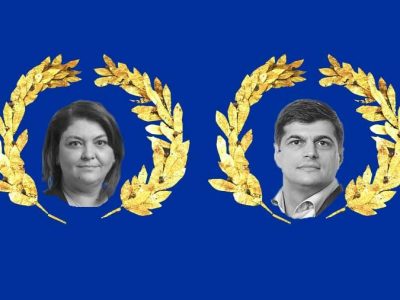
A group of digital rights advocacy groups installed a elephant to represent the figurative elephant at GCCS -mass surveillance. Photo from the Protection Lab Twitter account.
Last week, the Dutch capital of government, the Hague hosted “Cyberspace Week”, an international event intended to prioritize discussions about security, safety, and Internet policy at large.
All the while, a giant blow-up elephant stood nearby in the city's Plein neighbourhood, a cheeky symbol of the giant “elephant in the room” that is mass surveillance by governments, many of whom were represented at this conference.
What exactly is Cyberspace Week?
Cyberspace Week was padded with panels, discussions, meetings, and talks leading up to the two-day Global Conference on Cyberspace (GCCS). The stated goal of the event hosted by the Dutch government was to assemble government, private sector and civil society representatives “to promote practical cooperation in cyberspace, to enhance cyber capacity building, and to discuss norms for responsible behaviour in cyberspace.”
For many reasons, this was an opportune moment for the Dutch government to host such a conference. First, it gave them a chance to show off their foreign policy potential for becoming a global leader in multi-stakeholder cyberspace discussions. Deborah Brown, a senior project coordinator for Association for Progressive Communication (APC) specializing in Internet governance, told Global Voices:
Compared with [previous conferences] GCCS was more inclusive of civil society, in that many were present, even on panels, and were given financial support to attend.
But apart from this, they are also in a bid to become a non-permanent member of the UN Security Council for 2017-2018. There were many allusions to this point, from posters around the event to attendee swag, including bottles of Doppar water with special labels that read “Kingdom of the Netherlands, Your Partner for Peace, Justice and Development. United Nations Security Council Candidate 2017-2018.”
NGOs target mass surveillance
However, this was not the focus for civil society. Both literally and figuratively, civil society representatives kept their attention on the so-called “elephant in the room”: mass surveillance. The #TheElephantInTheRoom hashtag started trending on the conference feed during the event after several digital rights NGOs, led by Free Press Unlimited, erected a massive, inflatable elephant in the Hague's Plein neighbourhood.
Mass surveillance remains #theElephantInTheRoom for governments, also at #GCCS2015 pic.twitter.com/LqzuRPmhCN
— Menso Heus (@mensoh) April 15, 2015
This is not to say that there was no discussion of privacy at the event. A main stage session including Sir David Omand (the former director of UK intelligence agency GCHQ) and digital privacy expert Bruce Schneier addressed civil society demands to discuss mass surveillance. Schneier offered an argument supporting encryption as important for the public interest, while Omand contended that this needed to some conditionality:
Sir David Omand responds to @Bruce_Schneier‘s complaint, but suggests lawful warrants to break crypto necessary to catch criminals #gccs2015
— Mahsa Alimardani (@maasalan) April 17, 2015
If your crypto can be broken by a warrant, you have snakeoil, not crypto. https://t.co/gt9ItRsU6C
— Frederic Jacobs (@FredericJacobs) April 17, 2015
While calls to address mass surveillance by civil society were touched upon throughout conference discussions, the key outcome statement of GCCS2015 (the Chair's Statement) included only general references to the issue. The statement noted a “need to improve the protection of the rights to privacy…through appropriate national legislation, strong safeguards and effective oversight, consistent with international human rights law” but included scant elaboration on the subject beyond this.
Civil society members were invited to comment on a draft of the statement, but many of the points highlighted in that document were overlooked by government actors who led the drafting process. APC's Deborah Brown was perturbed by the outcomes, and told us:
…[the word] surveillance did not even get one reference in the chair’s statement, even though this is a priority for many from civil society, and measures to limit those programs.
The statement also failed to acknowledge civil society calls to limit state surveillance programs to the Necessary and Proportionate Principles, a set of privacy standards drafted by a coalition of civil society members in 2013.
Other criticisms came from individuals such as Sunil Abraham, a free software advocate and executive director of the Centre for Internet and Society in Bangalore, India. He told Global Voices:
It was a disappointing that the Chair's statement did not reference free software, the only means for the global citizenry, civil society and the technical community to defend themselves from the hegemony of multinational corporations and authoritarian states.
Global Voices also asked Wouter Jurgens, the Head of International Cyber Policy at the Dutch Ministry of Foreign Affairs, to comment on criticisms leveled against the final outcomes of GCCS.
The GFCE [Global Forum on Cyber Expertise] is an new and innovative forum. It has to grow and evolve. We want to make this a joint effort to help build cyber capacity. This will require both financial and technical commitments from all stakeholders. Civil society must be involved in this effort.
The GFCE, or the Global Forum on Cyber Expertise, is one of the most tangible outcomes of this conference. This body is supposed to provide global cyber capacity building through technical expertise and global funding. In reaction to the creation of the body in the Chair's closing statement, Brown noted that it is unacceptable that the GFCE did not involve members of civil society present at the conference, but she had to withhold further assessment until the GFCE proceeds with its program.



